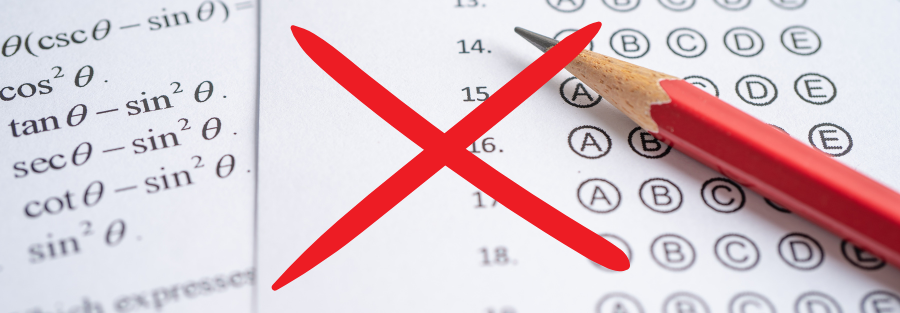5 Common NEET Exam Mistakes to Avoid


Are you preparing for the NEET test but finding the amount of material and study techniques overwhelming? You’re not by yourself. Thousands of prospective medical students encounter the same difficulties each year, and many of them make the same mistakes that can prevent them from succeeding as NEETs.
The good news is that you may greatly increase your chances of passing the test by being aware of these errors! Knowing what not to do is just as important as knowing what to concentrate on, regardless of whether you’re just beginning your NEET adventure or nearing the end of your preparation. We have determined the top 5 NEET test errors that may be preventing you from succeeding, ranging from poor time management to excessive stress. Are you prepared to change the way you prepare for the NEET? Let’s examine these typical mistakes and learn how to steer clear of them so you can fulfill your aspirations of attending medical school.
Inadequate Time Management
Neglecting to Create a Study Schedule
Not creating a systematic study strategy is one of the most common NEET exam errors. Students who don’t have a well-planned schedule frequently feel overburdened and unable to cover all the required material. Make a reasonable schedule that takes into account your skills and shortcomings and allot enough time for each subject.
Spending Too Much Time on Difficult Questions
Effective time management is crucial for the NEET exam. Too much time spent on difficult problems can leave little time for simpler ones. Practice recognizing challenging questions fast and then going on to questions you can confidently respond to. Keep in mind that if you have the time, you can always go back to more difficult questions later.
Not Allocating Enough Time for Revision
A crucial component of preparing for the NEET exam is revision. A lot of students undervalue the significance of going over previously learned material again. Incorporate revision time into your study plan to help you remember and comprehend important ideas.
Failing to Practice with Timed Mock Tests
Developing your time management abilities requires regular practice with timed mock exams. You can learn appropriate pacing techniques and become acquainted with the NEET test format by using these simulations. You will be more equipped to manage your time during the actual exam if you regularly practice under timed conditions.
Ignoring NCERT Textbooks
Relying Solely on Coaching Material
Many students make the mistake of relying solely on coaching materials because they think they are adequate for preparing for the NEET. Nevertheless, this strategy might work against you. Although they are useful additions, coaching materials shouldn’t be used in place of NCERT textbooks, which serve as the basis for the NEET exam format.
Underestimating the Importance of NCERT Content
The main source of NEET test questions is NCERT textbooks. Many of the exam topics are regularly taken directly from these publications by the National Testing Agency (NTA). You run the danger of losing out on important information and possibly receiving easy grades if you ignore the NCERT materials.
Missing out on Fundamental Concepts
NCERT textbooks are excellent at succinctly and simply describing basic ideas. They offer a firm grasp of fundamental ideas, which is necessary to answer challenging NEET test questions. Ignoring these resources could result in knowledge gaps that make application-based issue solving difficult.
Include NCERT textbooks in your study regimen to get the most out of your NEET exam preparation. Utilize them in conjunction with coaching materials to develop a thorough comprehension of the topics. This strategy will improve your chances of passing the test and guarantee that you are ready for its variety of question kinds.
Memorizing Without Understanding
Rote Learning Formulas and Equations
Relying exclusively on memorizing is one of the most frequent errors made on the NEET exam. Although mathematics and equations are essential for passing NEET tests, memorizing them without comprehending their meaning can backfire. When dealing with complicated issues that need a better understanding of the subject area, this method frequently results in confusion.
Failing to Grasp Underlying Principles
To succeed in the NEET exam, one must comprehend the basic ideas underlying scientific concepts. A common error made by students is to concentrate on details rather than exploring the main concepts. When responding to questions that call for critical thinking or the application of information in various situations, this lack of depth may cause problems.
Inability to Apply Concepts to New Problems
Students are frequently asked to apply their knowledge to novel settings in NEET exam scenarios. People who only use memorization could find it difficult to modify their knowledge to fit these novel issues. To handle the wide variety of questions in the NEET exam pattern, it is essential to cultivate the capacity for critical thought and flexible application of concepts.
Neglecting Practical Applications of Theories
Ignoring how scientific theories are applied in the real world is another typical mistake. Questions that assess a student’s capacity to relate theoretical knowledge to real-world situations are commonly found in NEET exams.
Students lose out on important chances to demonstrate their mastery of the material and to reinforce their comprehension when these links are ignored.
Focus on understanding the fundamental ideas, practice using what you’ve learned to solve different situations, and look into real-world applications of the theories you study to steer clear of these blunders. This strategy will help you do better on the NEET exam and increase your general scientific comprehension.
Neglecting Previous Year Question Papers
Missing out on Recurring Patterns
Ignoring the wealth of information concealed in last year’s question papers is one of the most significant errors made by NEET applicants. You can more efficiently concentrate your study efforts by using these publications, which frequently highlight recurrent trends in the kinds of queries posed. You can prioritize your preparation by identifying high-yield topics by examining these patterns.
Lack of Familiarity with Exam Format
Ignoring last year’s papers also prevents you from familiarizing yourself with the format of the NEET exam. In order to efficiently manage time during the actual exam, this familiarity is essential. You can better grasp the distribution of questions across subjects, the degree of difficulty, and the kinds of questions you’ll probably face by practicing with these papers.
Underestimating the Importance of Question Paper Analysis
A lot of students don’t realize how powerful question paper analysis is. In addition to answering the questions, this process entails comprehending the logic behind each response. It assists in pinpointing your areas of weakness and enhancing your ability to solve problems. Additionally, it helps you understand the examiners’ viewpoint, which enables you to approach issues more methodically.
Poor Stress Management
Overlooking the Importance of Breaks and Relaxation
Many students make the mistake of studying nonstop without taking enough breaks throughout the intensive NEET exam preparation. This strategy may result in reduced productivity and exhaustion. Taking regular pauses and practicing relaxation techniques are essential for sustaining concentration and efficiently remembering knowledge.
Neglecting Physical Health and Exercise
Mental performance is directly impacted by physical health. Exercise and healthy eating are often neglected by NEET applicants, which can have a detrimental impact on their stress levels and cognitive function. Even brief bursts of physical activity can increase vitality and sharpen focus.
Succumbing to Exam Day Anxiety
One common NEET exam error that can ruin months of study is exam day nervousness. Students frequently do poorly as a result of letting their nerves get the better of them. This anxiety can be reduced by learning stress-reduction strategies and taking practice tests.
Comparing Progress with Peers
A student’s confidence and concentration may suffer if they are constantly comparing themselves to others. Every student has a different learning path, and comparison just causes needless anxiety. Instead, concentrate on developing yourself in accordance with the NEET exam format.
Not Seeking help when Needed
For fear of appearing weak, many students are reluctant to seek assistance. But asking instructors, mentors, or even peers for advice can yield insightful information and helpful support. Recall that making use of the resources at your disposal is a wise NEET exam strategy, not an indication of insufficiency.
Avoiding these five typical NEET exam errors might greatly increase your chances of passing. Crucial components of NEET preparation include productive time management, in-depth knowledge of NCERT texts, comprehension-based learning, practice with last year’s papers, and appropriate stress management. To understand about your career and and comprehensive career path you can opt for Career Counseling in Aara Consultancy.
Recall that it takes both smart and hard work to succeed in the NEET exam. You can take the test with confidence and reach your full potential by staying clear of these dangers and concentrating on a comprehensive study plan. On test day, remain resolute and focused, and let your preparation do the talking.
We provide 360° Solution for your Education Needs. Contact us







